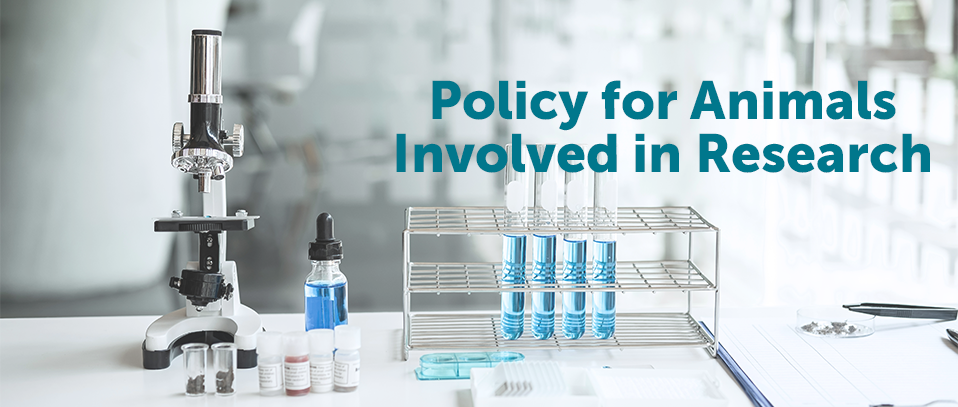Download a PDF of the Policy
Background:
The Michelson Found Animals Foundation, Inc. (the Foundation) and the Michelson Prize & Grants in Reproductive Biology (MPG) Program seek to end companion animal overpopulation by funding research to develop a safe, effective, and practical single-dose sterilant for use in cats and dogs. Research to develop such a sterilant holds great hope for continued progress in the fight against pet overpopulation and the elimination of euthanasia for population control.
The Foundation and MPG Program recognize that studies involving animal subjects may be necessary to improve the health and well-being of animals. The Foundation and MPG Program work to assure that each and every animal involved in a Foundation-funded research study receives excellent, compassionate care, and that no animal is harmed unnecessarily. All animal research funded by the Foundation through the MPG Program, or performed in pursuit of the Michelson Prize in Reproductive Biology (whether funded by the Foundation or not) must conform to the Foundation's Policy for Animals Involved in Research. Documentation of compliance with this policy is required in proposals submitted for MPG Program funding consideration, and helps to ensure the health and well-being of all animals affected by the Foundation’s work.
The Foundation and MPG Program can provide resources and guidance in support of this policy upon request.
Policy:
- 1. Principal Investigators’ Responsibilities
- It is the responsibility of the Principal Investigator to review this policy and acknowledge compliance with it in any research funded by the Foundation that uses animals. A copy of this signed policy is a required part of each proposal submitted to the Foundation that includes using animals in the research.
- It is the responsibility of the Principal Investigator to ensure that all animal care staff members participating in research funded by the Foundation are (i) provided a copy of this policy, (ii) appropriately trained, and (iii) adequately supervised to meet the requirements of this policy.
- In each proposal, the Principal Investigator shall provide the Foundation with statistical evidence that the number of animals proposed in the study is as small as possible to demonstrate significant treatment difference if one exists.
- Principal Investigator shall review relevant literature to prevent unnecessary replication of research and unnecessary utilization of research animals.
- Principal Investigator shall not perform any study that induces or allows pain or distress, other than short term minor pain or distress that can be controlled by appropriate anesthetic, analgesic, or tranquilizing drugs. All invasive procedures shall require balanced anesthesia and preemptive, multimodal analgesia.
- Principal Investigator shall report unexpected death of research animal(s) to the Foundation as soon as possible, and, in all cases, within two business days following the death. Research animals that die unexpectedly shall undergo full necropsy, with results and likely cause(s) of death reported to the Foundation when available.
- If the research study involves testing of a product candidate(s) that is comprised of rDNA (e.g. viral-vectored, recombinant subunit) in cats and/or dogs, the Principal Investigator shall ensure that the materials supplied to the Institutional Animal Care and Use Committee (IACUC) and Institutional Biosafety Committee (IBC), as part of their review of the research to be performed, will include information on post-study adoption plans for treated and control cats and dogs. For the purposes of this Policy, the Foundation defines “adoption” as the placement of a research cat or dog in a permanent home or, if the cat or dog is not suitable for placement in a permanent home, in an appropriate facility that will provide care and housing for the cat or dog for the remainder of its life.
- 2. IACUC Review and Approval
- Use of animals shall be humane and consistent with laws and regulations that have been approved by the Principal Investigator’s institution and any oversight bodies whose function is the regulation of animals in research. One example is the Institutional Animal Care and Use Committee (IACUC).
- A draft IACUC protocol submission shall be included with each proposal submitted to the Foundation. If the proposal is approved for funding, IACUC approval is required prior to release of funds, and the approval letter and approved protocol must be provided to the Foundation to be included in the grant contract. All protocol modifications and renewals must be provided to the Foundation as soon as they are approved by the IACUC.
- The Foundation requires documentation of institutional review equivalent to that of the IACUC in cases where IACUC review is unavailable (such as in countries outside of the US, animal ranch / sanctuary / preserve, veterinary practice, etc.).
- The Foundation requires IACUC, or equivalent, institutional review and approval from the submitting institution for all clinical trials, even though such approval may not be a requirement of the institution.
- All animal care, husbandry, and IACUC member structures shall meet or exceed the guidelines set forth in the U.S. Government’s Animal Welfare Act (Title 9 CFR Subchapter A – Animal Welfare) and the Institute for Laboratory Animal Research (ILAR), National Academies Press Guide for the Care and Use of Laboratory Animals (2011), and/or any additional required regional regulations.
- If a study utilizes archived samples, The Foundation reserves the right to request a copy of the IACUC application and approval of protocol(s) for original collection of those samples.
- 3. Animal Care, Housing, and Enrichment
- Investigators and animal care staff shall have appropriate qualifications and experience for conducting procedures on living animals as per IACUC approval. Each investigator on the study shall provide the required biographical sketch indicating those qualifications and experience as part of the proposal.
- Every animal shall have compassionate care, comfort, and protection from abuse and unnecessary pain. Investigators shall minimize distress in individual animals or populations of animals in accordance with the National Research Council’s Recognition and Alleviation of Distress in Laboratory Animals (2008), or any additional required regional regulations.
- The housing and environmental enrichment of research animals shall be appropriate for their species, and shall contribute to their health and comfort in accordance with the ILAR National Academies Press Guide for the Care and Use of Laboratory Animals (2011), and/or any additional required regional regulations.
- Investigators shall ensure that animals are appropriately socialized for their species and provide environmental enrichment. In addition, established and written guidelines for adequate preventative care must be followed.
- Investigators shall ensure the identification of individual animals involved in studies funded by the Foundation (i.e. ear tag, ear punch, ID chip, tattoo, etc.).
- 4. Owner Informed Consent
- The Foundation requires informed owner/responsible agency consent in all clinical trials and research involving owned animals. An informed owner/responsible agency consent form of minimum standards shall be provided to the Foundation in the proposal and executed by the Principal Investigator.
- IACUC approval of 1) protocols for research involving client-owned animals and 2) an informed client consent form is required before a project can be funded, unless it is the policy of the Principal Investigator’s institution not to review protocols for client-owned animals. If the Principal Investigator’s home institution will not permit IACUC review of such a protocol, the Michelson Found Animals Scientific Advisory Board will perform a review of a draft IACUC protocol and informed client consent form.
- 5. Disposition of Research Animals
The Foundation considers the issue of companion animal overpopulation to be of such importance to global animal welfare that a terminal endpoint to research studies may be justified in some cases. Investigators will not perform studies on an animal that require euthanasia as the study endpoint unless meaningful information can be obtained in no other way (i.e. alternative models have been thoroughly evaluated). Investigators shall be required to address euthanasia in every Michelson Grant application.
- Treated and control animals in research funded by the Foundation shall not be placed in other studies at the end of the project, with the exception of normal offspring born to control rodents. Such offspring may be returned to an institutional laboratory animal colony if they have undergone no other procedures than normal birth and physical examination.
- It is strongly encouraged that live rodents be placed for adoption at the end of the study. On a study by study basis, the Foundation may make sanctuary arrangements for rodents. If appropriately justified, and if approved in the research proposal, rodents may be euthanized.
- Treated and control dogs, cats, and rabbits shall be placed for adoption at the end of the project unless euthanasia is required as a study endpoint because essential information can be obtained in no other way, and the terminal endpoint was approved in the original proposal.
- If euthanasia is not required, a plan for placing dogs, cats, and/or rabbits into adoptive homes must be included in protocols submitted to the Institutional Animal Care and Use Committee (IACUC), and that plan must be approved by both the Foundation and the IACUC.
- The Foundation considers euthanasia acceptable when an animal develops unanticipated illness or injury that results in pain and suffering that cannot be alleviated with standard methods.
- The Foundation will not approve use of CO2 euthanasia of research animals due to stress this procedure induces, even though this procedure is approved by many regulatory agencies.
Procedures:
1. The Foundation’s Policy for Animals Involved in Research
- shall be available on the Foundation website at https://www.michelsonprizeandgrants.org/resources/animal-welfare-policy/;
- shall be provided to investigators invited to submit full proposals;
- shall set the standard for proposal review by the Scientific Advisory Board in the category research animal welfare (minimizing animal use; optimizing animal health; minimizing discomfort, distress, pain); and
- shall form the basis of review of progress reports submitted on funded proposals.
2. Animal care staff will be interviewed at site visits conducted by the Foundation to assess familiarity with the Policy for Animals Involved in Research.
3. The Foundation may perform unannounced site visits and/or independent audits for program assessment and/or to investigate concerns with animal welfare.
4. The Foundation may terminate a study and withdraw funding if violations of the Policy for Animals Involved in Research occur, as determined by the Executive Director with recommendations from the Program Manager, the Chief Scientific Officer, and General Counsel.
5. The Foundation reserves the right to amend or modify this Policy at any time. The Foundation will provide you notice of any changes to this Policy.
References:
1. Association for Assessment and Accreditation of Laboratory Animal Care International (AAALAC).
http://www.aaalac.org/
2. Institute for Laboratory Animal Research, National Academies Press: Guide for the Care and Use of Laboratory Animals, Eighth Edition (2011).
http://www.nap.edu/openbook.php?record_id=12910&page=1
3. Institute for Laboratory Animal Research, National Academies Press: Recognition and Alleviation of Distress in Laboratory Animals (2008).
http://books.nap.edu/openbook.php?record_id=11931&page=9
4. United States Animal Welfare Act (Title 9 CFR Subchapter A – Animal Welfare).
https://www.nal.usda.gov/awic/final-rules-animal-welfare-9-cfr-parts-1-2-and-3 and
http://www.ecfr.gov/cgi-bin/text-idx?tpl=/ecfrbrowse/Title09/9cfrv1_02.tpl


